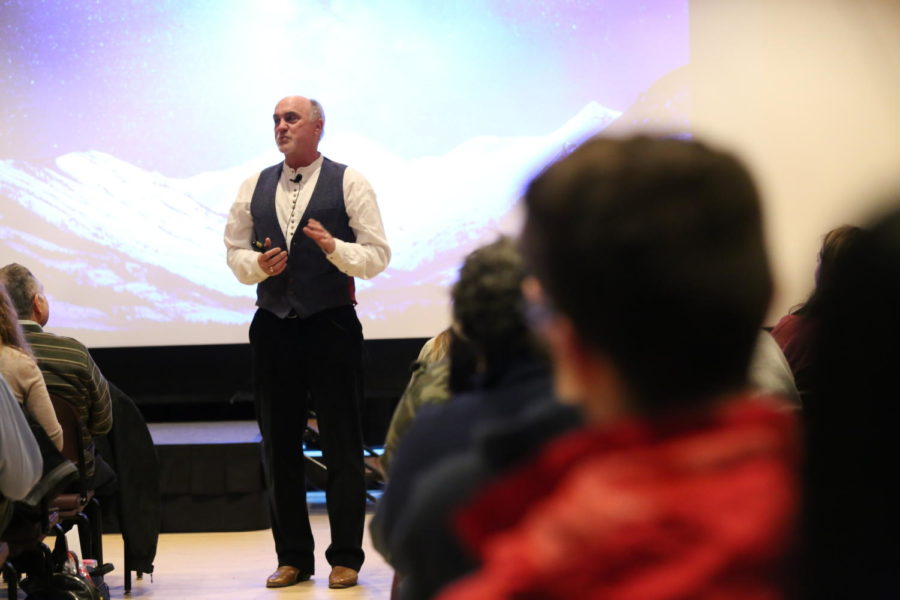Lecturer shares how to get a good night’s sleep
Danielle Peterson/Iowa State Daily
Brian Luke Seaward offers suggestions for how to improve the quality of one’s sleep during his lecture “Rest, Resiliency, and the Art of Digital Detox.” The lecture was held Tuesday in the Sun Room of the Memorial Union.
April 2, 2019
Lecture attendees learned about sleep and how it can affect a person’s health Tuesday in the Sun Room of the Memorial Union.
Brian Luke Seaward, who holds a doctorate in philosophy and is an expert in stress management, presented on getting a good night’s sleep. Seaward traveled from his home in Boulder, Colorado, where he works at the Paramount Wellness Institute. Seaward authored more than 12 books, including “Stand Like Mountain, Flow Like Water”.
Seaward asked if sleep is part of the crowd’s wellness program. When asked who in the crowd sleeps seven to nine hours every night, around one third of the room raised their hand.
Seaward said we sleep for restoration, memory processing, anabolic/catabolic cycle preservation and more. Seaward said by not getting enough sleep you compromise your memory. When you sleep, glial cells in your brain act like a vacuum and help you maintain your good memory.
A main focus of his lecture was that technology does not belong in the bedroom. He called this digital toxicity. Cell phones, ipads and TVs interfere with a good night’s sleep. Seaward said the blue light from the phone affects production of melatonin. A tip he recommended was if a person uses their cell phone for an alarm clock, go back to a normal clock.
Another concept he lectured on was sleep debt. Sleep debt is thinking you can make up for lost sleep on weekends. Seaward said this is not possible; what a person has lost is already lost. The body craves balance and leading a life where you can be on a schedule is ideal, Seaward said. Being on a schedule for everything from when you sleep to when you eat or exercise can affect your nervous system and circadian rhythms.
On the topic of improving sleep, Seaward said sleep wellness comes down to needing seven to eight hours of sleep.
The reason for needing eight hours is because the body goes through stages, Seaward said. There are five stages: transition, theta waves and spindles, delta and theta waves, delta deep sleep and finally REM sleep, which takes 90 minutes. He stated a person needs to have three to four REM cycles a night.
50 percent of Americans are sleep deprived and one third have chronic insomnia, Seaward said. At least 50 percent of insomnia is stress related. Some causes of stress include work responsibilities, finances and debt and family issues. While it is difficult to change all of these stressors, Seaward recommended some ways to help fall asleep at the end of the day.
Charisol is pumped out when a person is stressed and if someone is sitting still as these hormones are being pumped, it can destroy white blood cells. Seaward said if one does not get enough sleep, they are more prone to heart disease, cancer, obesity, depression and autoimmune diseases.
“Not to scare you, but just to be aware. Knowledge is power,” Seaward said.
Seaward also said Alzheimer’s is worse now than it was ten years ago, presumably due to stress and lack of sleep.
Seaward went over the different types of insomnia: transient, intermittent and chronic. If someone believes they need sleep medications, he recommended that audience members do their research because those medications can be addicting.
Seaward recommended trying Sleepytime tea or teas with chamomile, which help the nervous system relax, before looking into medication. Acupuncture, meditation and avoiding carbs at night were also recommendations Seaward gave to help a person fall asleep.
Seaward said he hopes his lecture will help many find a way to get the correct amount of sleep at night and live healthy lives.







